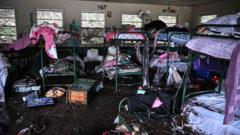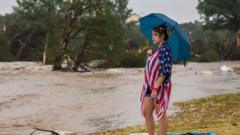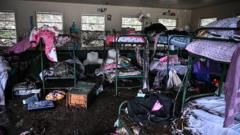Flash flooding in Texas has resulted in the deaths of 79 individuals, including many children. With several still missing, authorities are investigating the response shortcomings as experts highlight increasing weather extremes linked to climate change.
Texas Floods Claim 79 Lives, Spark Concerns Over Emergency Response

Texas Floods Claim 79 Lives, Spark Concerns Over Emergency Response
As severe rainfall leads to tragic fatalities in Texas, questions arise about emergency preparedness and climate change impacts.
The recent catastrophic flooding in Texas has resulted in the deaths of 79 people, including a heartbreaking number of 21 children. As search and rescue teams continue their efforts in central Texas, ominous forecasts predict additional rainfall and possible flash floods in already affected regions. Among the deceased, many remain unidentified, with concerning news that over a dozen campers from a local summer camp are still unaccounted for.
The situation escalated quickly after the first flash-flood warning was issued just before midnight Thursday, followed by severe weather that caused the Guadalupe River to swell dramatically, prompting urgent messages for residents and campers to find safety. As the community reels from this disaster, critical questions are rising about the preparedness of local emergency services. Reports indicate that several key roles at the National Weather Service were unfilled, raising doubts about the efficacy of flood response coordination.
Scientists are also drawing attention to the larger issue of climate change, which is causing extreme weather events, such as intense rainstorms, to occur more frequently worldwide. The alarming trend is being scrutinized in light of this tragedy, urging a deeper consideration of how communities can better adapt to the changing climate and enhance emergency management protocols.























